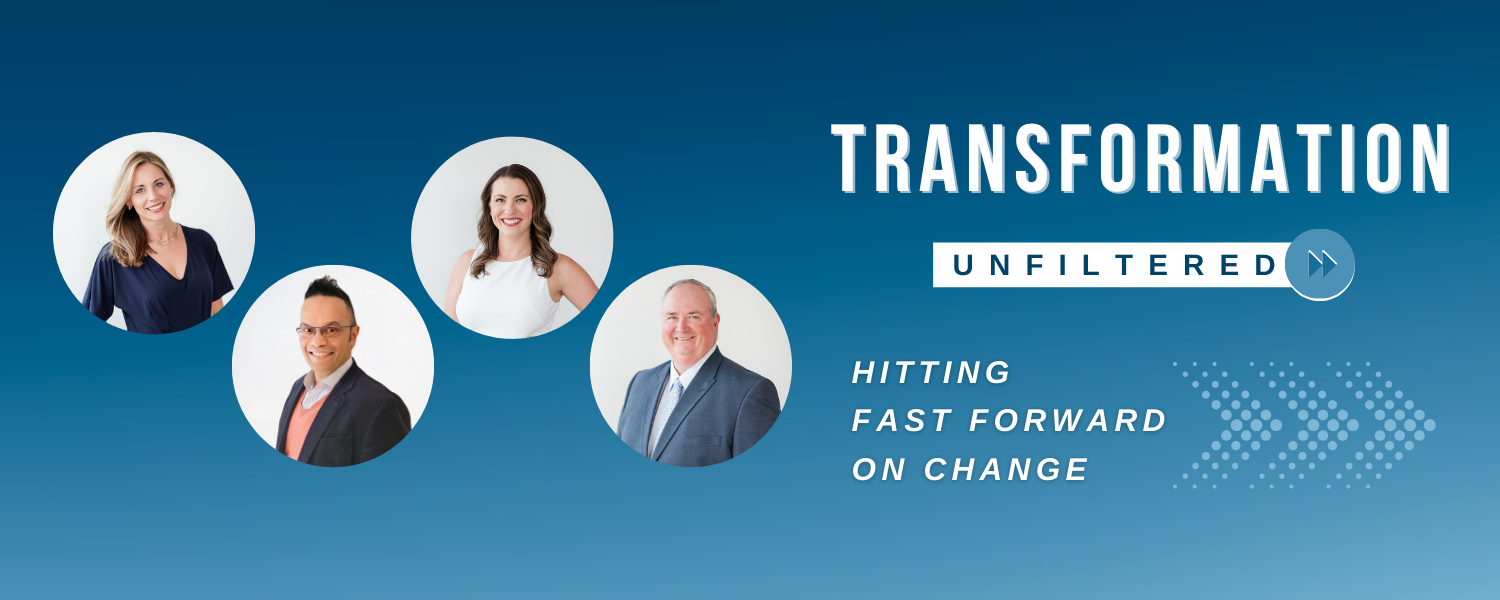Episode 34
The Art of Managing Up: Strategies to Align with Leadership
Summary:
Angie Collins shares her journey navigating the challenges of a new role in the banking industry. Facing a manager focused on short-term sales, Angie discusses her approach to building long-term client relationships and aligning her methods with personal values and organizational missions. Dr. Jim highlights how Angie's strategy—presenting solutions, being mission-driven, tapping into empathy, and maintaining authenticity—was instrumental in her success and offers insight into managing career challenges and professional growth. Tune in to learn effective career navigation strategies from Angie's experience.
Chapters:
0:00
Navigating Career Challenges with Short-Sighted Managers
3:31
Transitioning from Property Management to Banking Challenges
6:37
Balancing Client Needs and Sales Goals in Banking
Navigating Challenges Through Core Values and Managerial Insight
Transforming Management Focus from Short-Term Sales to Long-Term Success
Staying True to Values Leads to Success in New Industries
Staying True to Values in the Workplace
Building Long-Term Client Relationships in Private Banking
Effective Strategies for Managing Your Manager
Host Dr. Jim: linkedin.com/in/drjimk
Guest Angie Collins: https://professionals.townebank.com/angie-collins-eacafba831d9
Executive Producer Jim Kanichirayil: linkedin.com/in/drjimk
Music Credit: "Lost in Dreams" by Kulakovka
Transcript
And so it, she, so this manager was starting to really understand that, by doing that. She was, that they were able to get results stronger than they were, that they were getting before. And instead of being at the top, in the top, like top five of managers, this manager ended up being number one.
: We've all been there. New [:Today's story is about Angie Collins, who joined a new organization from a new industry, and as the new employee on the team had a way of working that didn't align with what her manager expected. And we've all been there where we've worked for these managers who just seem not to be able to get it.
They're so focused on the short term that they don't see the bigger picture. And unfortunately if you don't play the situation properly, you can end up completely nuking your career . And you're often finding yourself in a situation where you can feel trapped.
our conversation with Angie [:Angie is active in the community as a board member for the Chesterfield Partnership for Successful Living, serves as a Richmond cabinet member for free kind organization and enjoys attending local community outreach programs and events. Angie, welcome to the show.
Angie Collins: Thank you for having me.
Dr. Jim 2.0: this is gonna be a fun conversation. And as somebody who occasionally watches reality TV shows, we watch those to see other people screw up. So now it's for both of us to be on camera and talk about how things didn't go exactly how we planned in our careers.
in the moment you were like, [:Angie Collins: Yeah, so early on in my career as a relationship manager, I was really made the mistake of focusing on selling products instead of really. Understanding the client's long-term financial goals. And what didn't help with that was that I had this manager that was so focused on meeting their own individual goals that they constantly were asking me, what products did you sell today?
How many products did you sell today? We would have daily sales calls. At the end of each day was, I was being asked how many. Products. Did did you sell? It felt, it was really intimidating.
Dr. Jim 2.0: It's interesting that you describe your early experience that way where you have a manager who apparently isn't paying attention to how you're wired and they're constantly talking to you about the product side of it. What I'm curious about is when.
You landed this position, [:Angie Collins: So when I landed this position, it wa it was my first time in banking. I had been in a different role prior. I had been in a management role but when it came to, property management role I was focused at that time on managing. Residential apartments. And I had a team that I managed.
And so when I went into banking it was totally something totally different.
Dr. Jim 2.0: That's really interesting. So I'm thinking about your experience that you've talked so far. You got this manager that's all in your kitchen. You're in a new industry.
e's a lot of new that you're [:Angie Collins: Yeah, it really did. Yeah, so going into a, a brand new role, it was definitely trying, I wanted to, I had been so successful in my past role as a manager in managing these properties that I wanted to go right into this banking position and be successful. And it was overwhelming because there was a lot I had to learn.
And then I had a manager that was expecting me from day one to just, I was thrown in there and, we had all these financial product solutions to help with for clients that I really needed to learn the products as well as how can I help, the clients to, meet their long-term goals by offering these products.
And then [:Dr. Jim 2.0: So we're just piling on the bad or the ick on top of this. So you have new industry manager who doesn't get it. You have to learn, but all of the pressure is on execution. How do you execute well when you don't even know the product? These are all really big problems and then we layer on top of it.
This is banking, at the time that when you look back, what did that industry look like? What were you dealing with in terms of, the landscape of the industry, the landscape of people within the industry, the people that you're reporting to? What did you see and feel there? I.
Angie Collins: So I had to, I had to take a step back and, and really think about not, I had this manager, but then I had to think about the team surrounding me. My, the, my, the other bankers, my teammates partners that I had. And so I really started to kind. Rely on them to help me.
How [:And and really it was like a aha moment to. To remind myself that I needed to just kinda think about my values and wanting to make sure that I was helping them to meet their goal of long-term success as well as meeting my goals, long-term success. So really understanding. Their needs and then kinda taking time to just review that myself and really review the products at the same time to, to [00:08:00] be able to think about what long-term would I want to help them succeed.
Dr. Jim 2.0: I get that from. A theory perspective. And I also get get that from a mindset perspective. It's fine to wanna do this as as your normal operating rhythm, but you're still dealing with this manager who doesn't think that way and wants you to do it their particular way. How did you navigate that sort of disconnect between how you operate ver versus how the manager operated or wanted you to operate?
Angie Collins: what I started doing is I started documenting every client interaction, what we discussed. If I didn't at the time offer, a specific product, I documented why I didn't document this product. I also, brought in other team members within the bank to help with with maybe thinking about some other products that, we could.
road. But when I met with my [:And that kind of got to, the numbers that this manager felt like they needed, to have on a daily basis. But to really bring in the revenue and to really take care of my client's needs, I really needed to focus on their, their goals and really what to help them.
Eventually succeed is gonna bring, that's gonna bring in the revenue that's going to be needed for the bank. I also asked, when I was meeting with my manager, I also asked, I said how were, how. How were they able to, when they were in my role, how were they able to, balance meeting their sales goal as well as, doing what's best for the client.
etting feedback from them to [:And really try to, look at their buy-in on that as well. And and so it, it took, it was, it definitely took time, but I think I felt like that my manager was starting to really see that, I had what was in the best interest of not only the bank, but as of the clients.
s able to show and it seemed [:Dr. Jim 2.0: So there's a couple of things that you did that I'd like that I want to expand on. One you brought up the question, how did you navigate this when you were in my shoes balancing short term and long term? And this was a conversation that you had with your your manager.
And then you also presented some options in terms of things that were longer. Plays that would end up having bigger revenue implications to the overall book of business. So those two things, presenting alternatives as well as trying to trying to get the manager to go back to their time as an individual contributor.
thing that you see done at a [:Angie Collins: I thought about, my values growing up and how I I was taught and just it's how I navigated, my own personal life's journey. And I had to take a step back because I was definitely, I was excited about going into this new industry, into banking.
grity, doing the right thing.[:I. It just helped me to navigate with this manager and ask them, ask them the same thing, how did you navigate through it when you started out? What, you're, you're a leader in this in your role and at this bank, and there's a mission there.
To do what's right for the client to, a strong values with with who you are.
Dr. Jim 2.0: there's another part that I wanna dig into and that this is something that you mentioned earlier, that when you were going through this process, you had to rely on some of your team members. What sort of insight or intel did they arm you with that better equipped you to navigate this relationship?
you doing for me today? I am [:And so it, she, so this manager was starting to really understand that, by doing that. She was, that they were able to get results stronger than they were, that they were getting before. And instead of being at the top, in the top, like top five of managers, this manager ended up being number one.
actually started to kind. To [:And it wasn't, the pressure was not like it had been. And it was, and the team as a whole was able to feel more comfortable, more relaxed. They were able to really spend more time with their clients and really understanding and. The team as a whole was able to produce more than they had done before.
Dr. Jim 2.0: So when you look back on all of that that's a tricky set of scenarios to navigate. New industry, new job. Completely out of whack in terms of gender dynamics within the industry. You're learning while having the pressure to execute, and there's a whole bunch of stuff that we already covered as well, and you were able to manage through that and and get your legs underneath you.
shape your future growth and [:Angie Collins: I think the biggest thing that I learned is staying true to myself, staying true to my values, staying true to the clients, and staying true to the bank's mission. And so I think by doing all of that. I was able to show that success. This is how success happens. If you stay true to who you are, what you believe in, then you were going to, you're gonna come out ahead in the end also show, really taking the time with the people that you work with and explaining why you took this, why you're going down this road instead of, someone's telling you should do this. Maybe that's not always the correct way to to navigate. Maybe there, maybe you there, maybe you can, showed that there's some other [00:17:00] options available, and that if you look at those other options, then maybe you would come out ahead.
Dr. Jim 2.0: I like what you said about staying true to yourself. True to your values and aligning the mission of the organization and the values of the organization to what you do. That makes sense.
And for people that have, where this isn't their first rodeo, like you and me that makes all the sense in the world. But I'm sitting here thinking about that person that's early in their career. That's maybe, the first time in a new industry or whatever, and they hear that and they say that sounds all fine and good, but I just don't want to be hassled at work.
Maybe the best option for me is to keep my head down and my mouth shut. How would you respond to that person?
a wanna stay in a role where [:Feel right with you, know, that you're not agreeing and it's not making you happy. It's not driving success. I don't think you would want to stay in that role and not, actually give your opinion. It's not that you have to say, no, I'm not gonna do that, but at least just.
Give your opinion and explain why you're giving that opinion.
Dr. Jim 2.0: the part that I would probably add onto that is if you've. If you played the role a good soldier and you've tried to like, change hearts and minds and it's still not working, go somewhere else where people will actually respect you and want to want you to be heard.
So that's my 2 cents, but I tend to be a little bit direct when it comes to that sort of stuff. So we've gone through, your experience and the and what you experienced when you started out and how you navigated that and what you learned from it. What are some of the ways that this actually helped you fast forward your career by taking this approach?
so if I would've just looked [:Clients that I started out from the beginning, I'm now working with their children. Not only was I able to help them meet their long-term goals, they've referred me to their friends, their families. I was able to work with that next generation.
Dr. Jim 2.0: If folks want to continue the conversation, what's the best way for them to get in touch with you?
address and my phone number. [:Dr. Jim 2.0: Great stuff, Angie. Appreciate you hanging out with us. When I think about this story, there's a couple of things that stand out to me that's that's important to pull out. I think the big thing that you're talking about is how do you build a customer for life? And that's actually a great book that every that people should read.
That gets you out of the mindset of being a transactional sales professional and more of a relational and long-term thinking professional in general. So I, it's highly recommended, but when I think about what you did in your experience in managing your manager, there's four key elements of that framework that you employed.
but you tied those solutions [:And then the other part that you did is that you actually brought your manager. Back to when they were an individual contributor and asked them how would they actually navigate the situation or how did they actually navigate the situation when they were confronted with the same solution. So that is tapping into the empathy of the person that is sitting across from you as you're making your case.
empathy and be authentic to [:And if you use those four elements, you're always going to end up in strong footing and you might not get your way, but at least you can walk away from that scenario saying you made the best possible case you could make and move on. Without having to feel bad about it. And the net of all of that is that if you go through that effort on a regular basis and you try to impact change that way, and it doesn't work out, that's your signal that this isn't a place for you.
So you should go somewhere where you're gonna be heard and seen as an individual and be respected for the perspective that you bring to the table. So I appreciate you sharing that with us and hanging out with us. For those of you who've been listening to the conversation. Thanks for hanging out. If you like the show, make sure you leave us a five star review and then tune in next time where we'll have another leader sharing with us the game changing experiences that really made the difference in fast forwarding their careers.



